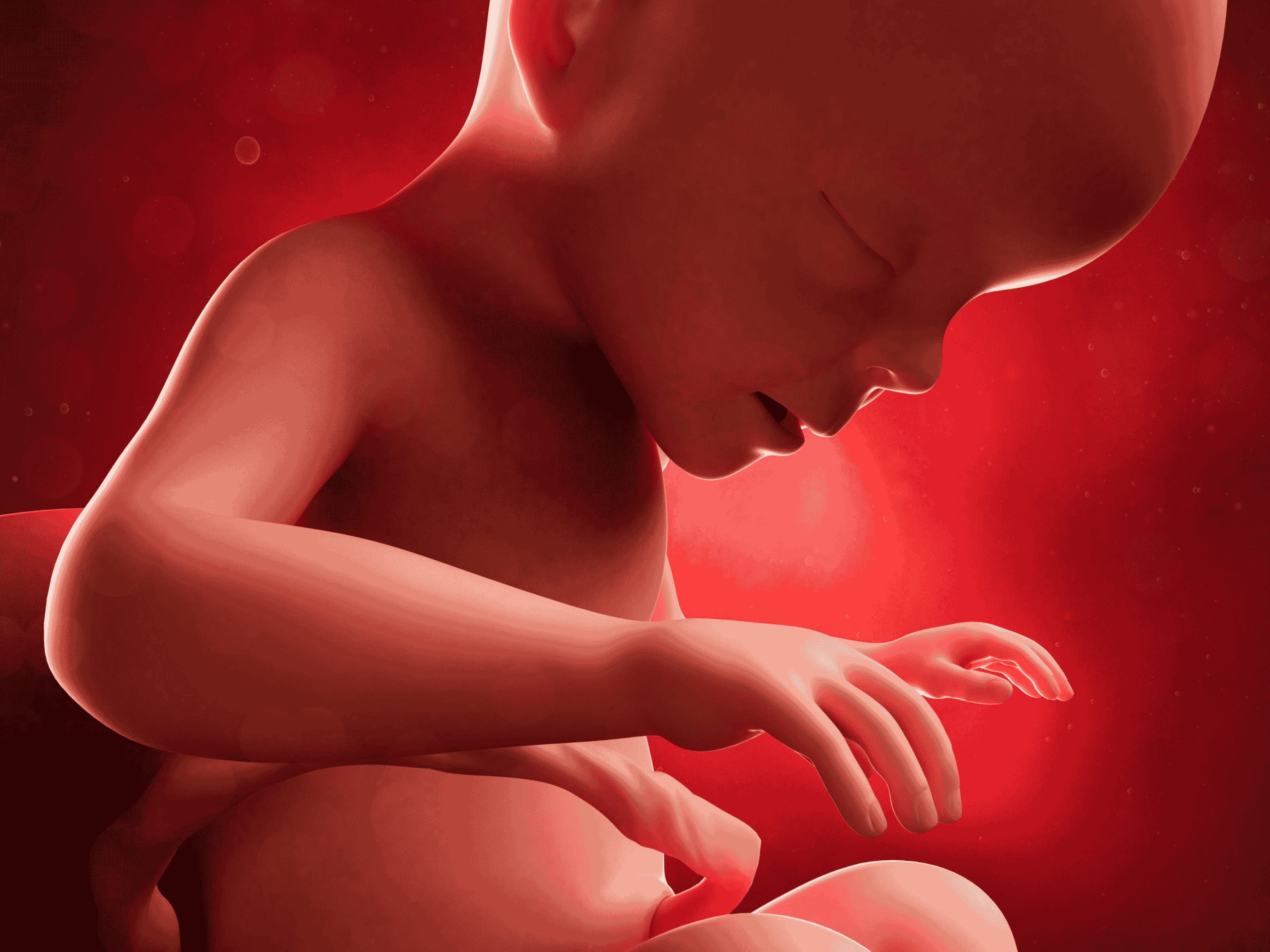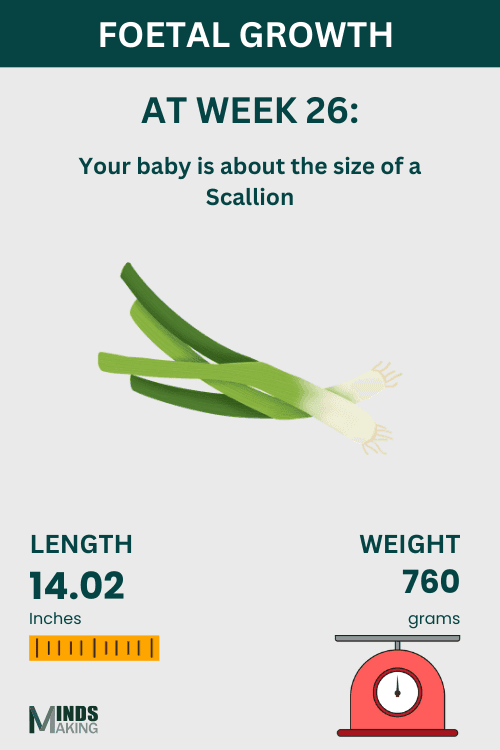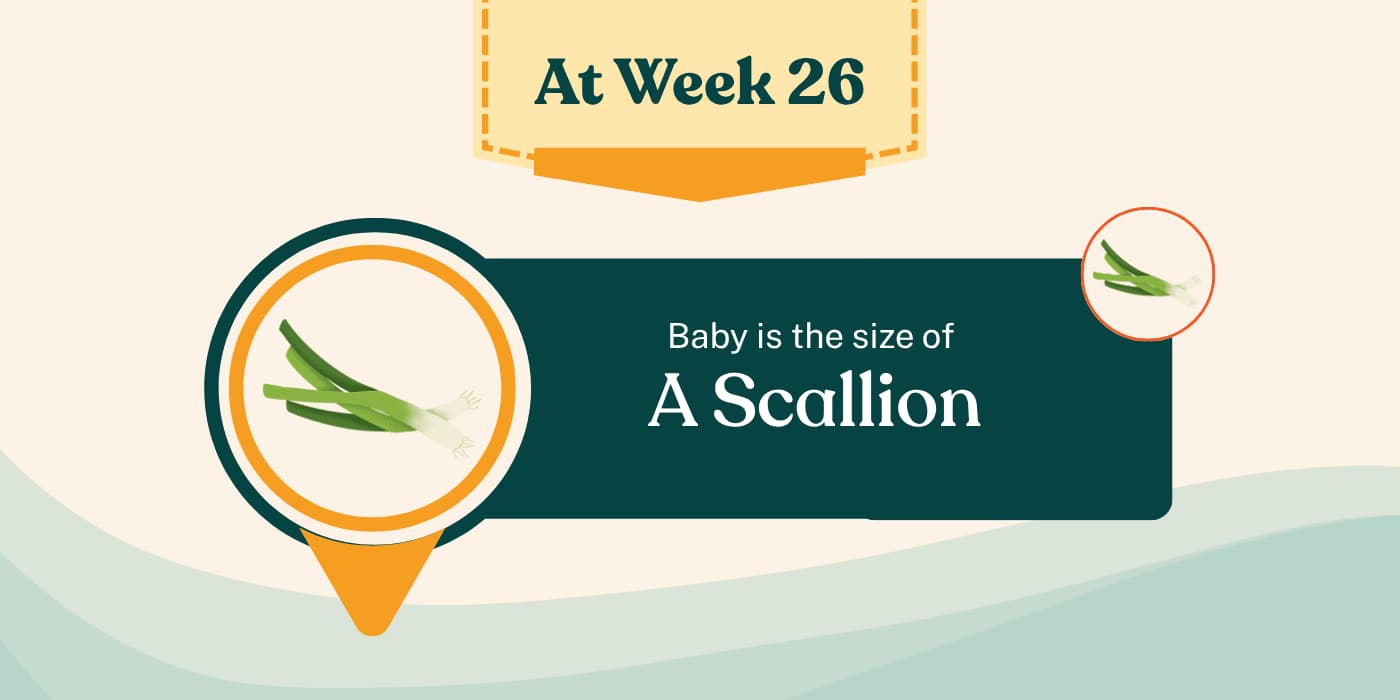Your Pregnancy at Week 26
Science photo library

Written by Mindsmaking Medical Writer
Fact Checked by Mindsmaking Professionals
27th, July, 2025
At 26 weeks, you’re in your sixth month with 14 weeks to go. Your baby has reached key growth milestones. You may feel tired and clumsy due to extra weight and changes in your body.
You are already in your sixth month at the twenty-sixth week of pregnancy, and you have only three months or fourteen weeks to go. Your baby has established huge growth milestones this week, and you will now enjoy more interaction with your baby. You may notice increased fatigue and a slight increase in clumsiness and lack of coordination. This is perfectly normal.
Carrying extra weight and the shift in your center of gravity due to your growing bump can affect your balance. You may need more time to complete your daily activities, such as walking to the bus stop. While it's important to stay active, remember that your body is constantly changing, so be gentle and patient with yourself during this time.
Key Takeaways
Your baby's eyes, closed for the past few months, will open and start blinking, although the iris still lacks much pigmentation.
Your baby measures around 14.02 inches and about 760 grams, comparable to a scallion.
You may experience more leg cramps, especially at night. Simple exercises like pulling your toes upwards or gently massaging the cramped muscle can provide relief.
The top of your uterus can now be felt around 2 ½ inches (6.3 cm) above your belly button and will grow by about ½ inch (1.25 cm) per week.
Lower back pain is common due to the shifting centre of gravity, weakened abdominal muscles, hormones loosening joints, and extra weight putting more strain on the back
Contact your doctor if you experience vaginal bleeding or fluid leakage, fever or chills, persistent severe abdominal pain or cramping, pain during urination, dizziness, or thoughts of harming yourself or your baby.
To improve sleep, limit fluids after dinner while staying hydrated during the day.
Plan intentional gestures such as dates or special outings can make her feel cherished and boost her spirits during this important phase of pregnancy.
Ensure gifts received during your baby shower meet current safety standards for your baby's safety.
Take a peek

Baby blink
Your baby will also be able to blink for the first time. This important skill helps prevent foreign substances from entering and lubricating the eye.

Cute eyelashes
All of your baby's eye parts have formed. Your cutie now has visible brows and lashes.

Swallowing practices
This week, your baby works hard to swallow amniotic fluid. This gesture is essential to the development of healthy lungs.
Baby Development at Week 26
The changes at this stage may appear minor, but they are vital as your baby prepares for birth. The nerves in their ears are maturing, enabling your baby to respond more reliably to sounds. (1)
Your baby's eyes have been closed for the past few months, will open and start blinking although the iris still lacks much pigmentation. Depending on ethnicity, some babies will be born with blue or grey-blue eyes, which may change color in the first year, while others will have brown or dark eyes. Eyelashes are developing, and more hair is growing on their head. (7)
Small amounts of amniotic fluid are inhaled and exhaled, which is essential for lung development. These 'breathing' movements also help prepare for the first gulp of air. The alveoli (air sacs) secrete surfactant to prevent the lung tissue from sticking together. If you're expecting a boy, his testicles are starting to descend into the scrotum, which takes about two to three days.
Mindsmaking

Body Changes at Week 26
There's a lot of activity happening inside your body right now. Fetal movements will become more coordinated as your baby's nervous system develops. And as they grow bigger and stronger, her movements will become strong, sometimes even painful for you.
They could try to stretch out their leg so far that the foot becomes lodged between your ribs. Try changing positions or doing some stretches the next time you're attacked. When your baby jerks too hard, you can gently adjust her back with your hand. That way, you might be able to send your little one back into her corner.
You may also be experiencing more leg cramps, especially at night. Simple exercises like pulling your toes upwards or gently massaging the cramped muscle can provide relief.
Are you finding yourself more forgetful lately? You may be experiencing what's commonly known as "baby brain," although it's not a medical condition and hasn't been scientifically proven. It could be attributed to fatigue and the mental load of pregnancy. If you're frequently misplacing items like keys, it's likely due to these factors.
Read This Next
No posts available
Baby Bump At Week 26
The top of your uterus can now be felt around 2 ½ inches (6.3 cm) above your belly button. As your pregnancy progresses, you can expect your uterus to grow by about ½ inch (1.25 cm) per week. If your healthcare provider measures your fundal height this week, it would typically be around 26 centimeters.
If you've been monitoring your weight and maintaining a balanced diet throughout your pregnancy, your weight gain should typically fall between 16 to 22 pounds (7.25 to 10 kg). This healthy weight gain supports your well-being and your baby's development
Pregnancy Symptoms at Week 26

Braxton hicks contraction
These contractions occur when the muscles of your uterus tighten and then relax, causing discomfort similar to mild menstrual cramps. While Braxton-Hicks contractions can start as early as the first trimester, you may not feel them until later in the second or third trimester. Distinguishing between false labor pains and real labor pains is important. According to recent research from 2017, Braxton-Hicks contractions typically vary in duration and intensity, making them irregular. They occur infrequently and unpredictably, causing discomfort rather than intense pain

Backache
If you're experiencing lower back pain during pregnancy, it's likely due to several factors. Your growing uterus shifts your center of gravity and stretches and weakens your abdominal muscles, putting more strain on your lower back when lifting or carrying things. Hormonal changes also play a role in loosening joints and ligaments. Additionally, the extra weight you're carrying increases the workload on your muscles and adds stress to your joints, leaving you tired and achy by the end of the day.

Stress and anxiety
Feeling concerned about the upcoming life changes is normal. If you have a history of depression or find yourself feeling more anxious than usual, it's important to discuss these feelings with your healthcare provider. They can offer support and guidance on managing stress during pregnancy. Maintaining a moderate exercise routine and spending time with friends can also be beneficial in reducing stress levels. It's essential to give yourself breaks and remember you're not alone in this journey.

Gas and bloating
It's normal to notice increased gas and bloating this week. This can be attributed to several factors, including the expanding uterus exerting pressure on the stomach and intestines. Additionally, hormonal changes often slow down the digestive process, contributing to feelings of bloating. To manage these symptoms effectively, consider eating smaller meals rather than larger ones, eating slowly, and incorporating gentle exercise. These steps can promote better digestion and reduce discomfort associated with gas and bloating.

Dizziness
Orthostatic hypotension is a type of low blood pressure that can occur when a person stands up after sitting or lying down. Pregnant women are particularly susceptible to this condition and may experience dizziness upon standing up quickly. To prevent orthostatic hypotension, standing up gradually from a seated or lying position is advisable. If you begin to feel dizzy, ask for assistance from someone nearby. In cases where dizziness is severe and there's a risk of falling, sitting down slowly on the floor is recommended until the sensation passes.

Clumsiness
You may notice increased clumsiness, such as knocking on objects or tripping more frequently. This is often caused by several factors, including loosened joints, the additional weight you're carrying, and changes in your center of gravity due to your growing belly. These changes can temporarily affect your balance and coordination. While this symptom is temporary and typically resolves after giving birth, it's important to take precautions to prevent accidents. Be extra cautious on slippery surfaces, particularly in the bath and shower. Also, take your time and use handrails or support when needed.
Pregnancy Concerns at Week 26
Watch out for contractions, as they can signify preterm labor. However, if you think you're having a contraction, you should not rush to the hospital immediately. Remember, it might just be Braxton-Hicks contractions, which are common and usually not a cause for concern.n
Keep an eye out for the slight chance of pre-eclampsia, a significant condition marked by elevated blood pressure, fluid retention, and protein in your urine. Symptoms can include headaches, blurred vision or seeing flashing lights, swelling in your feet, hands, and face, vomiting, and pain in your upper abdomen.
Other indications that you should contact your doctor during pregnancy, according to the OWH, include: (9)
- Vaginal bleeding or fluid leakage.
- Fever or chills.
- Persistent and intense abdominal pain or cramping.
- Pain or discomfort during urination.
- Dizziness.
- Less than ten fetal movements in two hours.
- Thoughts of harming yourself or your baby.
Health Tips for Week 26
Consume more fish
Despite previous concerns about mercury levels in fish, the FDA now recommends that pregnant women, breastfeeding mothers, and those planning to become pregnant should eat more fish. Fish are rich in essential nutrients, including omega-3 fatty acids, protein, vitamins, and minerals like iron. These nutrients are particularly important for pregnant mothers as they support healthy development in fetuses, infants, and children. The FDA advises consuming 8 to 12 ounces of fish low in mercury, such as salmon, tilapia, shrimp, canned light tuna, cod, and catfish per week, which is about 2 to 3 servings. You should avoid four types of high-mercury fish: tilefish from the Gulf of Mexico, shark, king mackerel, and swordfish.
Eat well and move more
Maintaining a diet rich in nutrients is crucial for you and your baby's health. Contrary to the myth of "eating for two," doctors recommend being mindful that the food you consume is your baby's primary source of nutrition. Therefore, focusing on balanced meals and moderate portions is advisable. As your pregnancy progresses, you may experience more discomfort and difficulties with sleep. Despite these challenges, regular exercise remains essential for the well-being of your pregnancy. A 2020 study highlighted that pregnant women who aimed to walk approximately 10,000 steps per day reported fewer insomnia symptoms and perceived better quality of life in their final trimester.
Increase your selenium intake
Ensuring you consume essential nutrients through a balanced diet is crucial during pregnancy to support your body and your growing baby. One particularly beneficial nutrient is selenium, a mineral that aids in building an effective antioxidant defense system. Antioxidants protect cells from damage caused by free radicals, linked to diseases such as cancer and heart disease. According to research, selenium also plays a role in the development of your baby's lungs. You can increase your selenium intake through foods like seafood, lean red meat, and grains grown in selenium-rich soil.
Reduce fluid intake at night
If frequent bathroom trips disrupt your sleep, try reducing your fluid intake after dinner. Ensure you stay hydrated during the day, but avoid drinking large amounts right before bedtime. Drink if you're thirsty, but avoid chugging a large water bottle before bed.
Ensure your meat or chicken is thoroughly cooked
When it comes to meat, fish, or poultry, ensure they're fully cooked. For chicken, pierce it with a fork; if the juices are red, it's undercooked, so continue cooking until the juices run clear. Check the thickest part of cooked meat and chops to ensure the middle is grey or brown without any rare spots. Rather than searing fish and serving it rare or medium, bake, poach, or grill it until it's fully cooked. To be sure, use a quality meat thermometer to check the temperature.
Advice for Partners
Your partner may experience uncomfortable stretch marks on their belly and other areas during pregnancy. You can help gently apply lotion or cream to their skin each evening. This not only relieves itchiness but also provides relaxation and shows your care and support during this time.
As your partner nears the end of the second trimester, she might start to feel less attractive due to the physical changes and challenges of pregnancy. You must express to her how beautiful she truly is during this time. Show your appreciation and support by planning intentional gestures to make her feel cherished and special. Consider taking her on a date or organising a special outing that allows her to relax and enjoy herself, helping to boost her spirits and strengthen your bond during this important phase of pregnancy.
Pregnancy Checklist for Week 26
- As you prepare for your baby shower and receive gifts from loved ones, remember to check for safety. Return or exchange items that don't meet current standards to ensure your baby's well-being.
- Now is a great time to decide who will support you during labour. This could be a partner, parent, friend, or professional doula. If you're considering a doula, interview potential candidates to find the right fit.
- You may also start considering your baby's feeding options. You might want to take a breastfeeding course or learn more about formula feeding, combo feeding, or exclusive pumping.
- Start planning any projects you must finish at work or around the house. Coordinate with your partner or employer to ensure you have the support needed to complete these tasks before the end of your pregnancy.
- If you've begun drafting a birth plan, it's advisable to review it with your healthcare provider. They can provide valuable input and guidance based on their expertise and your specific medical needs.
Frequently Asked Questions
How big is my baby at week 26?
Your baby is doing a lot, and now your body begins to feel the effects of it. Your baby weighs about 760 grams and is as big as a large scallion. Your baby also measures about 14.02 inches in height. They will gain more fat and weight in the remaining weeks of the pregnancy.
How many months am I at 26 weeks pregnant?
Pregnancies are typically measured in weeks, making it confusing to understand in terms of months. At 26 weeks, you're in your 6th month of pregnancy, although the exact division of the 40-week pregnancy into months varies. You're approaching the final stage of pregnancy, as the third trimester begins at 28 weeks. This transition signifies an important phase where your baby continues to develop and grow in preparation for birth.
What does spotting mean at 26 weeks pregnant?
Spotting, which is light vaginal bleeding, can occur during pregnancy for various reasons, such as cervical exams or intercourse. While it can be concerning if you're experiencing it for the first time, it's often not a cause for immediate alarm. However, Discussing any spotting with your doctor is advisable to rule out any potential concerns and ensure peace of mind.
Is sex safe at 26 weeks pregnant?
It's typically safe to have sex during pregnancy if everything is progressing normally and both you and your partner feel comfortable. However, it's best to consult your healthcare provider for personalised advice. You may need to explore different positions as your pregnancy progresses to ensure comfort.
How much fetal movement at 26 weeks is normal?
At 26 weeks of pregnancy, it's normal for your baby to be active, and you should typically feel regular movements throughout the day. The exact amount of movement can vary between pregnancies and individuals. Generally, you should feel your baby moving at least 10 times within two hours. This movement can include kicks, rolls, and stretches. If you notice a significant decrease in movement or are concerned about the frequency or intensity of movements, it's important to contact your healthcare provider for guidance and reassurance.
Was this article helpful?
How many stars are you giving this article?
Leave a comment
Your email address will not be published.










































